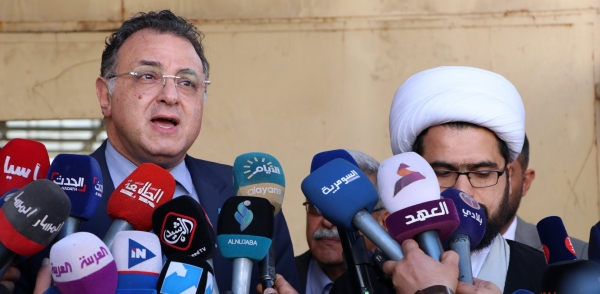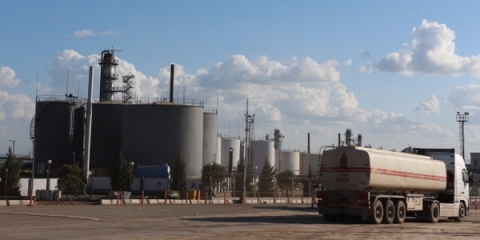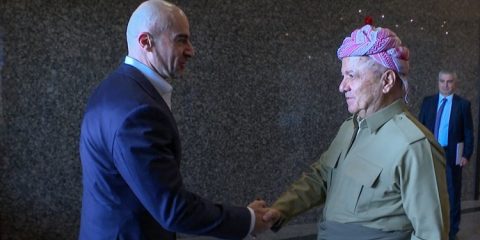Q&A: Dr. Adham Rashad Ismail, WHO head of mission in Iraq
The World Health Organization's representative in Iraq discusses how the country got ahead of the coronavirus and what needs still remain.
Preventative measures adopted by the government of Iraq bought the country time to prepare for a largescale outbreak of the new coronavirus (COVID-19), and a population that skews relatively young may help blunt the impact of COVID 19, according to the World Health Organization's (WHO) top official in Iraq.
But Iraq's rebuilding healthcare system still has significant gaps and, even with international support, will fight an uphill battle in the weeks and months ahead.
"There are of course short term measures and long terms measures: in the short term we need test kits, gloves, masks and gowns, M95 masks and negative pressure isolation rooms in every governorate," said Dr. Adham Rashad Ismail, the head of mission of the WHO in Iraq. "In the long term, we need to fund the health security plan we developed a year ago."
In a phone interview, Ismail described the measures currently being implemented by Iraq's government and the challenges that lie ahead– and the hopes that coming hot weather will play in Iraq's favor by reducing transmission rates.
Cathy Otten: How is the WHO assisting Iraq in fighting the coronavirus outbreak, and where are the weak spots in the country’s response?
Dr. Adham Rashad Ismail: As you know the situation in Iraq has a background and that background is that the country has been facing a lot of challenges. This has, of course, led to a decline in health services, including the response and preparation to outbreaks and emergencies. In March last year, we brought experts from Geneva and Cairo to assess the country’s ability to respond to emergencies and outbreaks. We found a lot of gaps and we set up a health security plan, but by the time that plan was adopted and reviewed and there was a national committee set to implement it, however, the plan was not implemented due to some serious challenges, so the plan was interrupted and I can safely say that the ability of the country to manage cases and response wasn’t that effective. The only way for us to come out of this threat of coronavirus is through prevention.
The WHO along with the Ministry of Health have focused on prevention because the health system is fragile. Now, what the WHO is doing: providing, of course, technical support as to what should be done at the borders and airports; training of personnel on risk, communication, mass gatherings and giving technical support.
Currently, the WHO is supplying test kits and personal protective equipment. This is still short of the needs, but there is a shortage globally and we requested Iraq to be a high priority to allow the country to tap into the resources available.
Another issue is how to manage cases: we had a training of trainers on how to test, and case lab training for lab personnel. We are also part of Committee 55 established by the PM to take national decisions such as putting schools and universities on vacation, closing malls, preventing some nationalities from coming in, closing the borders with Iran – this was all coming from this Committee 55, and we are present.
We have two WHO teams, one in the Kurdistan Regional Government (KRG) and one with the federal minister of health as well. We are trying to reactivate measures on the [stalled] response plan. We are also building infection control rooms, not building but equipping them in Baghdad and Erbil. They should have a negative pressure isolation room – this is to contain patients in one room and prevent it from spreading in other parts of the hospitals. None of this exists and now we have allocated resources to build up the rooms in Baghdad and Erbil containing four beds, this is what our budget allows. Each single room is four by six meters, and costs around $60,000 so we are spending $120,000 total. We need more. We also work with diplomatic community to guide them on measures how to protect and quarantine. We are also working in [displaced persons and refugee] camps.
CO: Have you seen any outbreaks in the camps?
Dr. Ismail: There’s one patient who has been identified and we quarantined them and we are now testing and if it is positive then that patient will have to be dealt with accordingly. We are making sure the spread of the disease is stopped and we are making sure all staff are wearing equipment.
CO: On the negative pressure rooms, are they complete, up and running?
Dr. Ismail: No they’re not. They are under construction now as we speak and are being equipped. We received an offer from supplier.
CO: How effective has the containment strategy of the federal Iraqi government and Kurdistan government been so far?
Dr. Ismail: First, the delay in the virus coming here is definitely due to our pre-emptive measures. We were so proactive. [After cases developed in Iran] we closed the border. The WHO and the Ministry of Health came up with a decision to close borders and on the 18th [of Feb] they were closed, and this closure was extended several times for a week and then another week. The closure of border and the quarantine measures were crucial. The first cases all came from Iran. Two days ago local transmission started so we expect to see higher numbers now. We delayed it so long and we hope that the temperature is rising, we hope the virus will fall and die in the summer. We expect that, but it might surprise us. We delayed the [spread of] virus by almost a month now so we bought some good time. The number of cases will increase but I think if we manage to go into the 30s in terms of temperature then the transmission will be much less.
CO: Does the lower median age in Iraq have a significant impact?
Dr. Ismail: It is a factor. Our WHO experts when they went to China on 16-21 Feb, 25 of our top notch experts spoke with the Chinese and did some studies on the virus and we discovered: 1. the median age of those infected was 51 years old; 2. most people who died, died because of another reason such as cancer or heart disease or old age; 3. for people 18 years old and less, only 2 percent were infected and 100 percent of infections were mild and the percentage of those who recovered was close to 99 percent and no one died, so it doesn’t affect children, so with all of these factors we expect in the young population of Iraq we will not see those high numbers already.
CO: What more can the international community do to assist Iraq?
Dr. Ismail: There are of course short term measures and long terms measures: in the short term we need test kits, gloves, masks and gowns, M95 masks and negative pressure isolation rooms in every governorate. There has been a hospital assigned in every governorate and once a patient is positively identified he should be put in an isolation room. We also need training for personnel at the border, equipment such as thermal scanners at every point where there are mass gatherings: malls, religious shrines etc in the short term. In the long term, we need to fund the health security plan we developed a year ago. In Iraq there are problems with chemical hazard, radiation, infections – not only corona. We have cholera and influenza so we need to strengthen the preparedness and response. We need to implement plan and that will cost a lot
CO: How many test kids does Iraq have and how many does it need?
Dr. Ismail: Thousands. I would say we have about 3,000 to 5,000 test kits. I would say with our...if you test 500 people then out of 500 tested a maximum 5% have the virus, so if we move at this rate, 5 patients per day it means we consume maybe 500 kits for every 10 patients, others have different symptoms. Every day we need almost 300-500 test kits. One and a half months until the temperature rises, so we need 40-50 days multiplied by 300 so we need 15,000 to 20,000 kits, and these kits are not reusable.
CO: We’ve heard of citizen protests, particularly around Diyala border posts, where residents are unhappy with the perceived slow response, lack of border controls and lack of medical teams at the border. You said you’re impressed by the response so far but how do you account for this public dissatisfaction?
Dr. Ismail: I would have to differentiate between two things: Committee 55, top officials and the minister of health himself – these decisions were very good, pioneering, and not politically smeared and scientifically based. We took proactive decisions to close the border. The implementation, however, varied across the different governorates. Had the implementation of these measures been fully implemented, then we would have seen fewer cases. The implementation started out weak, became moderate but now it is improving, which is what we want.
CO: Have any industries or officials been reluctant to follow procedures?
Dr. Ismail: Of course you will find this sometimes – in Italy they said we will quarantine tomorrow and everyone fled today. The government took a decision on Saturday and by Saturday night everyone left. This is a classic example, sometimes human behave differently. Sometimes people are risk aware, public health aware, take rational decisions, some others try, they think it’s a normal influenza or they think WHO is exaggerating.





